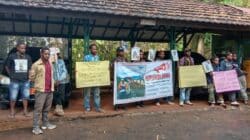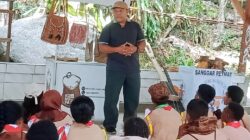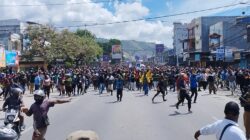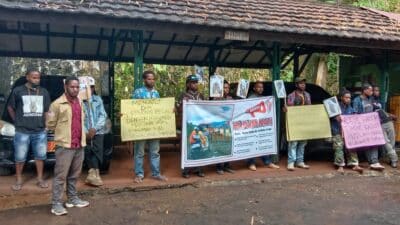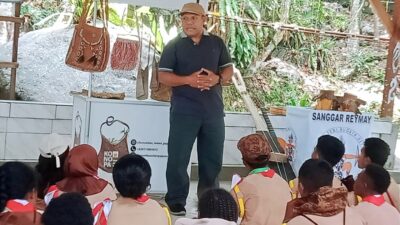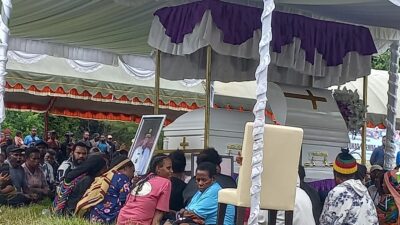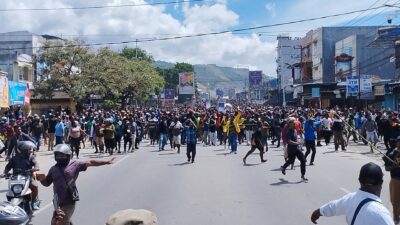Jayapura, Jubi – The Commission for Missing Persons and Victims of Violence (KontraS), the Legal Aid Institute Foundation (YLBHI), Amnesty International Indonesia and families of victims of the Paniai case (7 – 8 December 2014) have highlighted many irregularities in the investigation of the case by the Attorney General’s Office (AGO).
The investigation, which began on December 3, 2021, was considered to have caused confusion due to the use of the term “general investigation”, which was neither stated in Law Number 26 of 2000 on the Human Rights Court nor the prevailing Criminal Procedure Law.
“We are monitoring through official information channels owned by the AGO and media that can be accessed by the public. According to the National Commission on Human Rights (Komnas HAM), there are a number of things that must be addressed in the resolution of the case that killed four teenagers and injured at least ten people in Paniai,” said Trioria Pretty, Head of the KontraS Impunity Monitoring Division in a written statement received by Jubi on Monday, March 28, 2022.
Based on at least eight press releases made by the AGO from December 2021 to March 2022, 61 witnesses consisting of civilians and members of the Indonesian Military (TNI) and Police have been examined by investigators from the AGO. This process took place in at least three locations, namely Jakarta, Papua, and West Sumatera.
However, based on the information received by Jubi, the AGO has yet to contact the families of victims or their lawyers. Whereas in the Criminal Justice System, including for gross human rights violations, the Prosecutor is a defender and companion for victims to achieve justice.
The three NGOs questioned why the AGO had not yet exercised its authority to appoint ad-hoc investigators as suggested by Article 21 Paragraph (3) of the Human Rights Court Law. The ad-hoc investigators must be the one with a proven track record of working for human rights and has a victim perspective. This step is important to make the investigation participatory and independent in order to obtain and use the best evidence in the ongoing judicial process.
The investigation of alleged gross human rights violations is time-limited in accordance with Article 22 of the Human Rights Court Law, therefore the AGO must also consider this so that prosecution can run well and in accordance with the values, principles and provisions of law and universal human rights.
“Looking at the previous Human Rights Court process for three other gross human rights violations, namely the Abepura case, the Tanjung Priok case and the Timor Leste case, no wonder the victim’s family and the public are doubting the ongoing investigation into the Paniai case,” Trioria added.
There are still records of the lack of coordination between the AGO and the families of the victims resulting in weak indictments in the previous processes. This includes the failure to hold accountable those in the chain of command and only prosecute field actors. “We are worried that the AGO will not be optimal again during this process. Coupled with the fact that only one of the 15 gross human rights violations that were raised to the status of an investigation during the nearly eight years of President Jokowi’s leadership, the doubts of the victim’s family are valid,” she said.
The families of the victims of the Paniai case also expressed their doubts that the current law enforcement process could lead them to achieve justice. They reflected in the unresolved cases in Papua that were carried out by officers, either members of the Indonesian Military (TNI) or the National Police. In their statement, the victim’s family mentioned several cases, such as the Dogiyai case which killed two people (Dominokus Auwe and Alwisus Waine) in 2011, and the murder of Pastor Jeremiah Zanambani in 2020. Apart from the Paniai case, there are several other serious human rights violations that have occurred in Papua that have not yet been raised to the investigation stage despite presenting sufficient preliminary evidence, including the cases of Bloody Wasior (2001) and Bloody Wamena (2003).
The human rights situation in Papua continues to decline throughout the years, with the government keep sending military troops to Papua and using a security approach that often turns violent. Various parties including the United Nations have submitted various findings about the alarming situation in Papua, wherein many civilians fall victims, become internally displaced people, and experience other human rights violations on a daily basis.
Therefore, the victim’s family together with KontraS, YLBHI and Amnesty International Indonesia urged the Attorney General’s Office to appoint an ad-hoc human rights investigator from the community with a victim perspective to participate in the investigation of the Paniai case.
They also demanded the AGO to hold accountable several high-ranking TNI and police officials proven guilty in the Paniai case, as well as urging President Joko Widodo to stop the human rights violations that continue to occur in Papua by stopping the security approach to Papua and start engaging in peaceful dialogue. (*)



